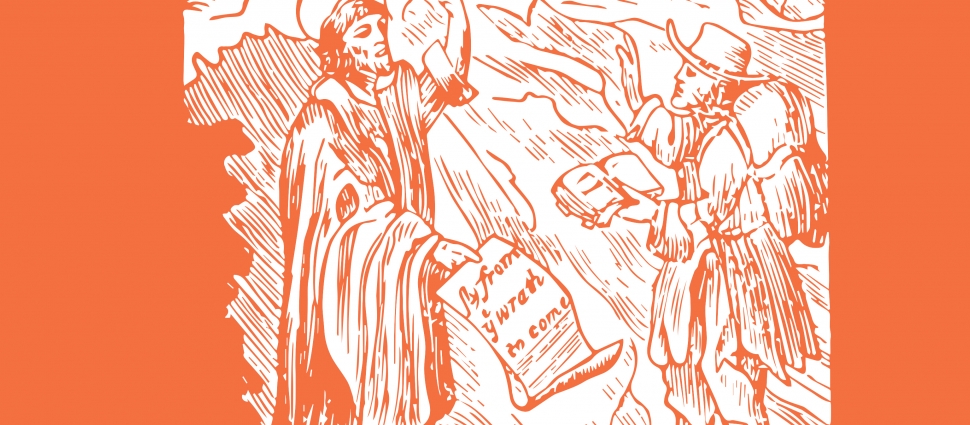Faith & Repentance

Which logically comes first: Faith, or repentance? This theological conundrum has been debated from time to time within the Reformed world. It is important to note that the point of contention pertains to logical and not chronological priority. Most people do not argue that there is a time gap between faith and repentance. They occur at the same time, which is the reason both sides are able to say that the Christian repents believingly and he believes penitently. The question deals with the logical order of faith and repentance.
Sinclair Ferguson, in his book The Whole Christ, follows Thomas Boston in arguing for the logical priority of faith. After approvingly quoting Boston that repentance comes after remission of sin, Ferguson says that “in the order of nature, in terms of the inner logic of the gospel and the way its ‘grammar’ functions, repentance can never be said to precede faith.” He also seems to suggest that the Westminster Standards promulgate this view (pg. 101).
The puritan John Ball, however, says that in one sense faith precedes repentance, but in another sense, repentance precedes faith. He says that if faith is taken in the large sense “for a beliefe of the promise, if we repent and receive it, then faith is before repentance.” A sinner, argues Ball, needs to know that God is merciful and gracious in order to repent of his sin. After all, if there is no reason to think that God will not relent from treating you according to your sins, why bother turning from your sin to God? Hence, Ball says that “there can be no turning without hope of pardon, nor coming home by hearty sorrow, without some expectation of mercy.”
But if faith is taken in a narrow sense “for that faith or beliefe whereby we receive, embrace, or rest upon the promise of God in Christ Jesus for pardon and forgiveness” then repentance “must goe before” because a person turns from sin in order to come to Christ. “The motion is one, but the points are two. For in drawing nigh unto Christ, the soul ariseth from sin: which may be called repentance.”
Herman Witsius, a Dutch theologian who wrote a book at the request of some Puritans, argued that faith and repentance spring up together “from the same principle of spiritual life.” They intermingle and energize one another, so that it is impossible to determine, which one comes first. A spiritually alive person sees “itself defiled and undone with innumerable sins” and simultaneously sees “Christ full of grace, truth and salvation.” As a result, the person “with shame and sorrow” flies to Christ so that he may be justified and sanctified.
John Murray, in his modern classic Redemption Accomplished and Applied, favors Witsius’ position on this issue. He says that the question of which one is prior is unnecessary “and the insistence that one is prior to the other is futile. There is no priority.” Faith and repentance are interdependent because faith is faith in Christ for salvation from sin. Since “faith is directed to salvation from sin, there must be hatred of sin and the desire to be saved from it. Such hatred of sin involves repentance which essentially consists in turning from sin unto God.”
What should we think of all of this? John Ball makes a good point that a person will not repent unless he knows that God is merciful. In that sense, a general faith does seem to precede and motivate repentance. But by the same token, a person will not see his need for mercy unless he sees and hates his sin. Repentance, thus, seems to precede and motivate faith. At any rate, Ball, Witsius and Murray are correct that coming to Christ involves repentance. We turn from sin (repentance) to Christ (faith). Moreover, I think that Witsius and Murray are correct to say that faith and repentance are mutually dependent and belong together in the order of nature. There is no priority, or at least we shouldn’t be dogmatic about which one might have the priority. However, what we should be clear about and what we should proclaim, contrary to Boston, is that faith and repentance both precede justification and remission of sins (see my two previous posts on repentance: "David Clarkson on Repentance" and "Repentance and Salvation").
D. Patrick Ramsey (@DPatrickRamsey) is pastor of Nashua Orthodox Presbyterian Church in Edinburg, Pennsylvania. He is a co-author (with Joel Beeke) of An Analysis of Herman Witsius's The Economy of the Covenants and author of A Portrait of Christ.
Related Links
- Grace Worth Fighting For by Danny Hyde
- Right with God: The Doctrine of Justification (Audio Disk Set | MP3 Disk Set | MP3 Download Set)
- The Gospel Pure and Simple (Audio Disk Set | MP3 Disk Set | MP3 Download Set)
- Antinomianism (Print Booket | PDF Download)
- Knowing I Was Born Again ( PDF Download )





